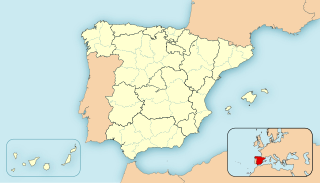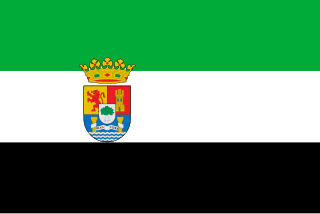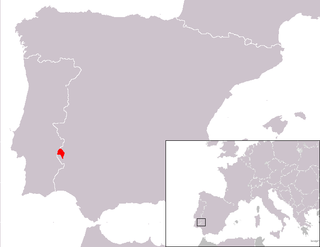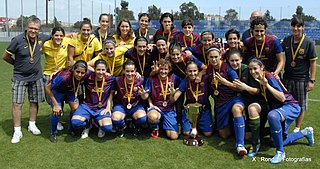
The province of Badajoz is a province of western Spain located in the autonomous community of Extremadura. It was formed in 1833. It is bordered by the provinces of Cáceres in the north, Toledo, Ciudad Real in the east, Córdoba in the south-east, Seville, and Huelva in the south and Portugal in the west.

Olivenza or Olivença is a town in southwestern Spain, close to the Portugal–Spain border. It is a municipality belonging to the province of Badajoz, and to the wider autonomous community of Extremadura.

The War of the Oranges was a brief conflict in 1801 in which Spanish forces, instigated by the government of France, and ultimately supported by the French military, invaded Portugal. It was a precursor to the Peninsular Wars, resulting in the Treaty of Badajoz, the loss of Portuguese territory, in particular Olivenza, as well as ultimately setting the stage for the complete invasion of the Iberian Peninsula by French forces.

San Felices de los Gallegos is a village and large municipality in the province of Salamanca, western Spain, part of the autonomous community of Castile and León. It is located 102 kilometers from the provincial capital city of Salamanca and has a population of 442 people, with a 2017 Wolfram Alpha estimate placing it at 427. It is situated within the Arribes del Duero Natural Park.

Táliga or Talega is a Spanish town and municipality located near the border with Portugal, in the province of Badajoz, in the Spanish autonomous community of Extremadura. Portugal considers Táliga, as well as neighbouring Olivenza, a de jure part of the Portuguese concelho of Olivenza, occupied by Spain since 1801..

Torre de Miguel Sesmero is a municipality located in the province of Badajoz, Extremadura, Spain (Europe).

Tierra de Badajoz is a comarca in the province of Badajoz in the autonomous community of Extremadura, western Spain. The majority of its population, amounting to around 177,000 inhabitants, lives in the capital, the municipality of Badajoz, and the immediate surrounding area.

Extremadura Unión Deportiva Femenino, formerly known as CF Puebla Extremadura and later as Extremadura Femenino CF, was a Spanish women football club from Almendralejo.

Extremadurans are the native people of Extremadura, in the central-west of Spain.
Llanos de Santa Lucía formerly known as Santa Lucía is the youngest of the districts of the Paraíso canton, in the Cartago province of Costa Rica. It was established as the fifth district on 21 July 2004.
The 2011–12 Primera División (women) season will be the 24th since its establishment. Rayo Vallecano are the defending champions, having won their 3rd title in the previous season. The campaign will begin on 4 September 2011, and end on 27 May 2012.
Carolina Ana Trindade Coruche Mendes is a Portuguese football striker, who plays for Racing Power and the Portugal women's national football team.
Club Deportivo Badajoz Femenino, formerly known as Sociedad Polideportiva Comarca Los Llanos de Olivenza and Club de Fútbol Femenino Badajoz Olivenza, is a Spanish women's football club from Olivenza in Badajoz, Extremadura founded in 2003.
The 2012–13 Primera División season was the 25th edition of Spain's highest women's football league. FC Barcelona were the defending champions, having won their 1st title in the previous season. The season played from 2 September 2012, and end on 5 May 2013.

The Llanos de Moxos, also known as the Moxos plains, are extensive remains of pre-Columbian agricultural societies scattered over the Moxos plains in most of Beni Department, Bolivia. The remains testify to a well-organized and numerous indigenous people. This contradicts the traditional view of archaeologists, notably Betty Meggers, who asserted that the Amazon River Basin was not environmentally able to sustain a large population and that its indigenous inhabitants were hunter-gatherer bands or slash-and-burn farmers. In the 1960s, petroleum company geologists and geographer William Denevan were among the first to publicize the existence of extensive prehistoric earthworks constructed in the Amazon, especially in the Llanos de Moxos.

Olivenza Fútbol Club is a Spanish football team located in the town of Olivenza in the province of Badajoz, autonomous community of Extremadura. They currently play in Tercera Federación – Group 14, holding home matches at Ciudad Deportiva Ramón Rocha Maqueda, with a capacity of 5,000 spectators.
Belén Martínez Sousa is a Spanish footballer who plays as a forward for Villarreal.

Oliventine Portuguese is the dialectal variety of the Portuguese language natively spoken in the disputed municipalities of Olivença and Táliga, in Extremadura (Spain). Currently, the Portuguese of Olivença and Táliga is not recognized by Spain, which has administered this territory since the War of the Oranges in 1801. Portugal, however, does not recognize Spanish sovereignty over the region and claims it as its own.

The 2011–12 season was the 24th season in which FC Barcelona Femení took part in an official league, and the first time they won the Royal Spanish Football Federation top-flight league title. In doing so, they qualified to enter the UEFA Women's Champions League in the following season for the first time. They also won the Copa Catalunya for the third consecutive time.













